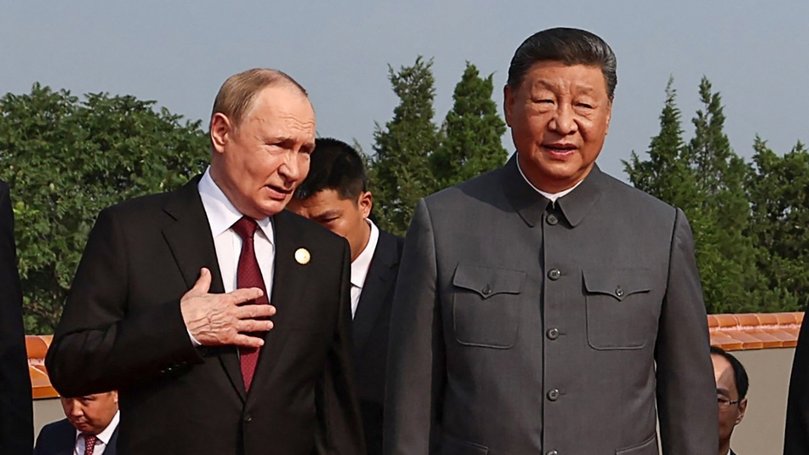THE NEW YORK TIMES: In a hot mic moment, Xi and Putin muse about organ transplants and living forever
THE NEW YORK TIMES: As the leaders of China and Russia walked to the viewing platform at a military parade in Beijing, they were caught by a hot mic discussing a wild possibility.

As the leaders of China and Russia walked to the viewing platform at a military parade in Beijing on Wednesday, they made small talk about living forever.
Xi Jinping, China’s leader, mused that people might soon live to 150. President Vladimir Putin of Russia, speaking through a translator, said that organ transplants could allow humans to achieve “immortality”.
The fragments of banter were captured by a microphone and broadcast live by Chinese state news media from the parade celebrating the 80th anniversary of the end of World War II.
Sign up to The Nightly's newsletters.
Get the first look at the digital newspaper, curated daily stories and breaking headlines delivered to your inbox.
By continuing you agree to our Terms and Privacy Policy.It was a hot mic moment that shed light on how medical advances are intersecting with geopolitics, given that both Putin and Xi, who are both 72, have suggested they may want to stay in power for years to come.
Asked about the comments in a news conference later Wednesday, Putin confirmed that the conversation had taken place.
“Modern health methods,” Putin told a reporter, “allow humanity to hope” that “life expectancy will grow significantly.” Among those advances, he said, were “medical means, even surgical ones, related to organ transplants.”
Putin has long been reported to take a personal interest in longevity, and he has tasked his health ministry with increasing life expectancy as a “key priority”.
Nuclear energy conglomerate Rosatom, one of Russia’s most important state companies, said last year that it was developing technology to “print” human organs.
There is no evidence that replacing people’s organs one by one can extend their life nor is there any substitute for the human brain, which also undergoes the changes of aging. But Putin apparently referred to organ transplants as a key to longevity as he chatted with Xi ahead of Wednesday’s parade.
The live footage picked up the voices of a translator and of Xi as the world leaders walked to the viewing platform on Tiananmen, or the Gate of Heavenly Peace, which marks the entrance to the former palace of China’s emperors.
Kim Jong Un, the North Korean ruler, accompanied the pair and appeared to be listening in through another translator.
“People rarely lived to be over 70, but these days, at 70, you are still a child,” a man apparently translating Xi’s comments for Putin could be heard saying in Russian.
“Biotechnology is making advances,” Putin responded, according to the translator, now speaking in Mandarin for Xi. “There’ll be constant transplants of human organs, and maybe even people will grow younger as they age — even achieving immortality.”
“It could be that in this century humans might be able to live to 150 years old,” Xi can then be heard saying.
While Xi has until now shown none of Putin’s enthusiasm for publicly discussing any hopes for longevity, he has suggested that he wants to stay in power, and therefore alive, for some time yet, avoiding any hint that he has chosen a successor.
“It’s our shared hope that the elderly can be well cared for, happy and live to a ripe age in good health,” he has said.
But during Wednesday’s military parade, Xi did not entirely hide his age. There was gray visible in his hair — not always the case for Chinese leaders, who sometimes dye their hair luxuriantly black, even in advanced age.
With round-the-clock medical care, Chinese leaders can live for a long time. Deng Xiaoping died at 92, and his successor, Jiang Zemin, died at 96.
Putin, for his part, engineered a change of Russia’s constitution in 2020 that would allow him to rule until 2036, when he would be 83. He is fixated on his health, people who know him say, and required those he met face to face during the COVID-19 pandemic to quarantine for as long as two weeks to see him.
This article originally appeared in The New York Times.
© 2025 The New York Times Company
Originally published on The New York Times
